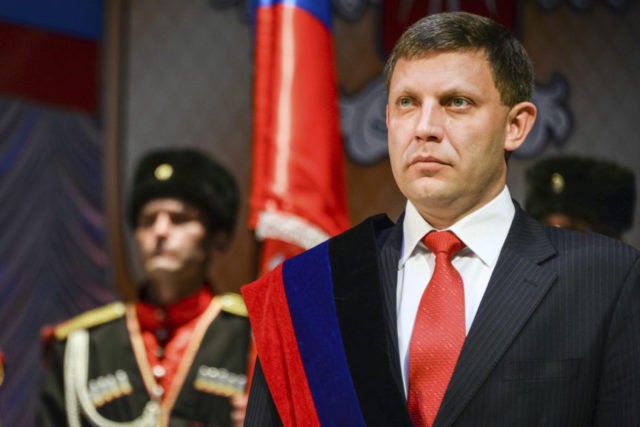The leader of the Russia-backed separatists fighting in eastern Ukraine’s Donetsk region was killed Friday by an explosion at a cafe, according to the separatists’ official news agency.
Rebel news agency DAN reported the afternoon explosion killed Alexander Zakharchenko, 42, the prime minister of the self-declared Donetsk People’s Republic. The separatist government’s revenue minister, Alexander Timofeev, was severely injured in the blast, according to Russian news agencies.
The Donetsk People’s Republic, along with a self-proclaimed separatist republic in neighboring Luhansk, has fought Ukrainian forces since 2014, the same year Zakharchenko assumed the title of prime minister of DPR’s secessionist government. In excess of 10,000 people have died in the conflict and more 1.5 million have been displaced.
Separ, the Donetsk cafe hit by the explosion, had a separatist-themed decor and camouflage netting hanging from its eaves, recent photographs show.
⚡️Aleksandr Zakharchenko, head of Russia-backed "Donetsk People's Republic" in eastern Ukraine, reportedly killed in bombing at a Donetsk cafe called "Separ," as in separatist. Info from local sources, LifeNews, Mash channel. 3 others said to be wounded. pic.twitter.com/qo0FC5Fkts
— Christopher Miller (@ChristopherJM) August 31, 2018
It was not immediately clear if a bomb caused the blast or it resulted from something else. Russia’s Interfax news agency cited local sources as saying suspects had been detained, but there was no official confirmation. Denis Pushilin, the speaker of the separatists’ parliament, blamed Ukrainian forces for the explosion, calling it “the latest aggression from the Ukrainian side.”
Reacting to the incident, Russia accused “the Kyiv war party” of “staging” terror attacks. “They are not fulfilling promises of peace, and as we see, they decided to move on the bloody battle,” Maria Zakharova, Russia’s Foreign Ministry spokesperson, said in a statement.
Igor Guskov, the head of Ukraine’s intelligence agency SBU, suggested Moscow may have been behind the explosion.
“We have reasons to believe that Zakharchenko’s death could be the result of an internal struggle among the militants, mostly due to redistribution of business interests,” Guskov said. “However, we also don’t exclude the possibility that it was an attempt by Russian intelligence services to remove a disliked figure, which, according to out information, became superfluous and was bothering the Russians.”
The rebellion in Donetsk and Luhansk arose soon after pro-Russia Ukrainian President Viktor Yanukovych was driven from power amid mass protests in February 2014. Russian-speakers predominate in the two regions, and separatist sentiment skyrocketed. Encouraged by Russia’s annexation of Crimea, which occurred following Yanukovych’s ouster, rebel leaders initially hoped their regions would be absorbed by Russia.
The Associated Press contributed to this report.

COMMENTS
Please let us know if you're having issues with commenting.